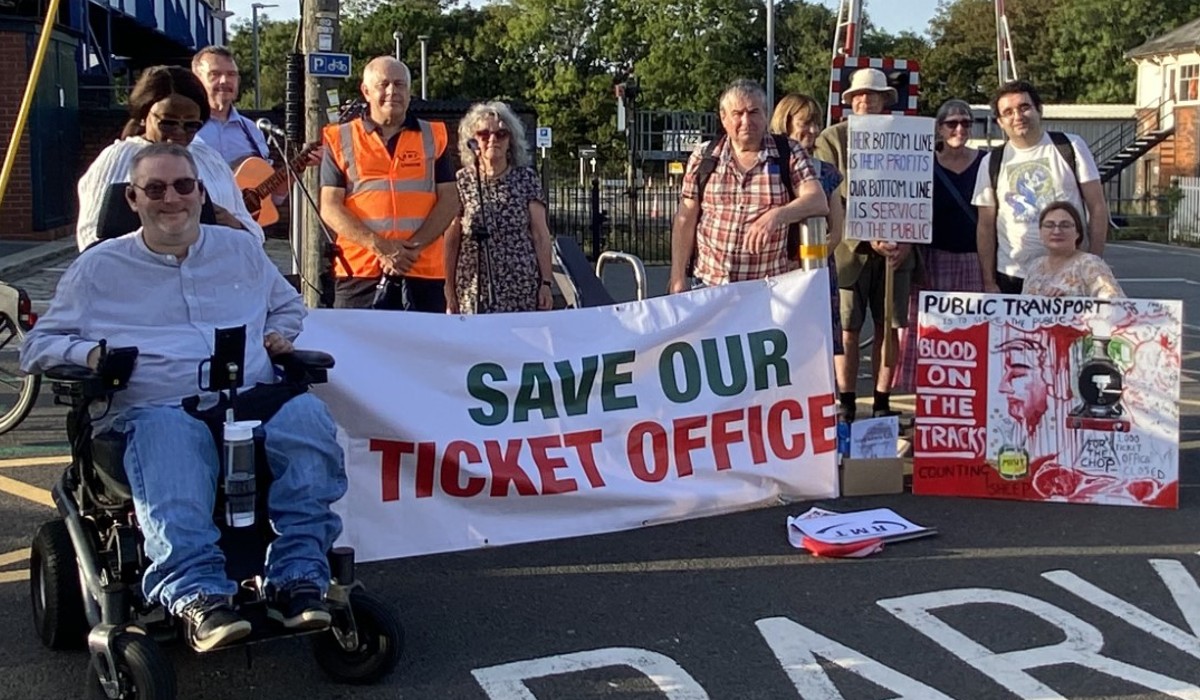 Campaigners in Truro, September 2023. Photo: @RMTunion / Twitter
Campaigners in Truro, September 2023. Photo: @RMTunion / Twitter
The government’s retreat over ticket offices shows that protest works, and it gives an opportunity to build further support for re-nationalisation, argues Kevin Crane
As U-turns go, this one isn’t the most surprising, but it is very satisfying.
Mark Harper, the latest totally underqualified Tory transport minister, announced on Tuesday that he was ‘asking’ train operating companies (TOCs) to withdraw plans to close almost all ticket offices in English train stations, on the grounds that this would not meet ‘high passenger standards’. The TOCs have snapped back at him that the office closures were actually a government idea, and that they’d always had deep misgivings about it. A failed idea is, as usual, an orphan.
The truth is that the both the government and the employers were equally guilty of the brutal and absurd plan to scrap services that are widely viewed as crucial to the useability of public transport. The intention was clear: industrial resistance by rail workers was going to be crushed and the abolition of ticket-office jobs would be a means toward achieving that. The supposedly good arguments for this bit of industrial dirty war were transparently fake. The saying that ‘only 12% of tickets’ are sold at offices works as a reason only if you pretend that that isn’t a hell of a lot of actual tickets. Claims that office staff would be more helpful in other roles can be disproven by simply pointing to the impact similar closures had on London Underground.
What the establishment did not anticipate was that their claims were overwhelmingly rejected by the public. They had bet that the unions, RMT and TSSA, would be hopelessly isolated on the issue. What actually happened was a truly massive popular rejection, driven by groups representing women’s rights, disabled people’s rights, and the interests of passengers at large. The official public consultation on office closures has more public engagement than any similar survey in British history, with three-quarters of a million people taking their time to respond. We haven’t got the official ratio, but I think we all know what the verdict was.
Office closures had become toxic for the Tories, and there were rumors that local Conservative Associations had been pleading with their own government to change course or face serious consequences at the ballot box. Allegedly, former transport secretary Grant Schapps – currently tipped as a potential replacement for the hapless PM Rishi Sunak – was one of the MPs given grim warnings about what might happen if the main station in his constituency no longer had a ticket office.
The scrapping of this absurd policy has been victory for workers and passengers, and for future of the rail sector. It is also a very clear instance of protest actually working. We should deepen the alliances that formed around this issue, and push for the real change that we need to deliver high passenger standards: abolish the TOCs and bring rail operations back into public ownership.
Before you go
Counterfire is growing faster than ever before
We need to raise £20,000 as we are having to expand operations. We are moving to a bigger, better central office, upping our print run and distribution, buying a new printer, new computers and employing more staff.

